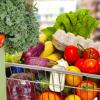The Dutch diet can be healthier and more environmentally sustainable without costing consumers more money. This holds for all socio-economic groups in the Netherlands. This concludes Reina Vellinga (RIVM) in her doctoral thesis. Even with minor adjustments, our diet becomes much healthier and with less impact on the environment.
